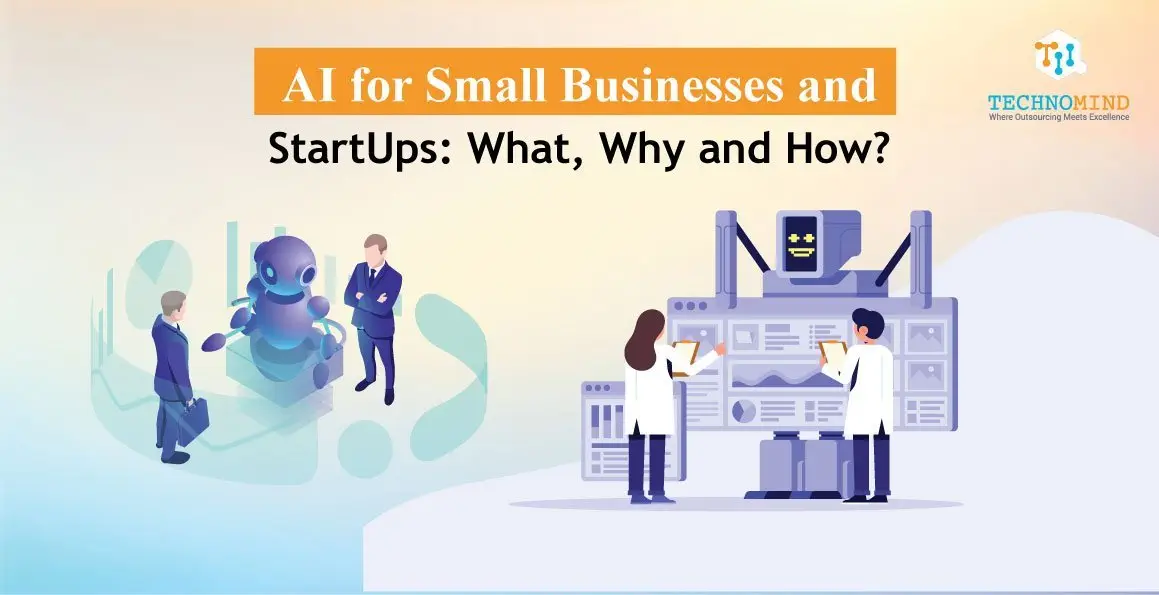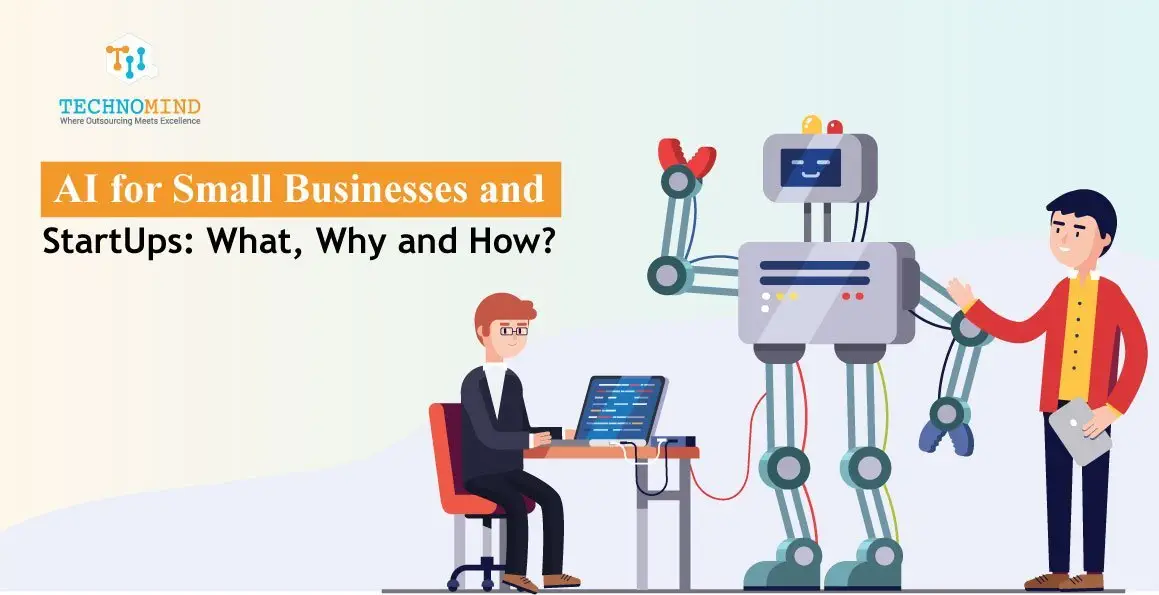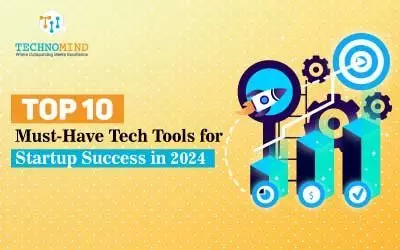Blog
AI for Small Businesses and StartUps: What, Why and How?
Artificial intelligence (AI) is a subtle hero in the bustle of modern business that is changing the rules for startups and small businesses. It’s more than just a fancy tech term—consider it a digital ally that powers small enterprises.
This article will explore the secrets of the intersection of AI and small business ownership, showing how it’s more than just a tool—rather, a crucial component of success.
So, get ready and let’s dig more into it.
How AI Empowers Small Businesses?
Automating Routine Tasks
AI takes over the mundane and repetitive tasks that used to consume valuable time. From data entry to routine customer queries, small businesses can redirect their human resources to more creative and strategic endeavors.
Personalized Customer Interactions
Gone are the days of one-size-fits-all approaches. AI enables businesses to personalize customer interactions by analyzing data and understanding individual preferences. This not only enhances customer satisfaction but also builds long-lasting relationships.
Data-Driven Decision-Making
Small businesses often operate in a data-rich environment, but making sense of this data can be challenging. AI comes to the rescue by analyzing vast datasets, extracting meaningful insights, and empowering decision-makers to make informed and strategic choices.
Enhanced Efficiency in Operations
AI streamlines internal processes, optimizing workflow efficiency. From inventory management to supply chain logistics, AI algorithms identify bottlenecks and suggest improvements, ensuring that operations run seamlessly.
Cost-effective Marketing Strategies
Marketing is a crucial aspect of small business success. AI-driven tools assist in creating targeted and cost-effective marketing campaigns. By analyzing consumer behavior, AI helps businesses tailor their marketing efforts for maximum impact.
Predictive Analytics for Business Planning
AI’s predictive analytics capabilities allow small businesses to anticipate market trends, consumer demands, and even potential challenges. This foresight aids in proactive business planning, ensuring readiness for whatever the future holds.
Improved Cybersecurity Measures
Small businesses are not immune to cyber threats. AI plays a pivotal role in enhancing cybersecurity by identifying patterns indicative of potential threats and implementing proactive measures to safeguard sensitive information.
Customized Employee Training Programs
Tailoring training programs to individual employee needs becomes feasible with AI. By analyzing performance data, AI can recommend personalized training modules, fostering continuous learning and skill development.
11 Tips for Leveraging AI in Startups and Small Businesses
Start with Clear Objectives:
- Define specific business goals before integrating AI.
- Clarify whether the focus is on customer engagement, operational efficiency, or data analysis.
Identify High-Impact Areas:
- Conduct a comprehensive business process analysis to pinpoint areas with the highest potential for AI impact.
- Prioritize tasks that are time-consuming or prone to errors for automation
- Seek feedback from employees to identify pain points and areas where AI could enhance efficiency.
Understand Your Data:
- Assess the quality and quantity of existing data sources.
- Ensure data relevance by focusing on information directly related to business objectives.
- Identify any gaps or inconsistencies in the data that could impact AI performance
- Implement data cleaning processes to enhance the accuracy of AI predictions.
Invest in Employee Training:
- Equip your team with skills to collaborate effectively with AI technologies.
- Foster a culture of continuous learning to adapt to AI integration.
Choose the Right AI Tools:
- Select AI tools that align with specific business needs and goals.
- Prioritize user-friendly tools that facilitate seamless integration with existing workflows.
- Consider the scalability of the chosen tools to accommodate future business growth.
Prioritize Data Security:
- Encrypt sensitive data to protect it from unauthorized access.
- Implement multi-factor authentication to enhance user access security.
- Regularly update security protocols to address evolving cyber threats.
- Conduct periodic security audits to identify and address potential vulnerabilities.
Test and Iterate:
- Implement AI solutions incrementally for controlled testing.
- Gather feedback and iterate on strategies for continuous improvement.
Embrace Cloud Solutions:
- Choose reputable and secure cloud service providers.
- Opt for cloud platforms that offer scalable AI solutions to accommodate business growth.
- Evaluate the cost-effectiveness of cloud-based AI services compared to traditional infrastructure.
- Implement robust backup and recovery mechanisms for data stored in the cloud.
Collaborate with AI Experts:
- Engage with experienced AI consultants or experts to understand the specific needs of your business.
- Leverage external expertise to fine-tune AI strategies and implementations.
- Foster a collaborative relationship to ensure ongoing support and guidance.
Stay Ethical and Transparent:
- Maintain ethical AI practices and transparent communication.
- Clearly inform customers about AI use and align algorithms with ethical standards.
Monitor and Evaluate Performance:
- Establish key performance indicators (KPIs) aligned with business objectives.
- Implement real-time monitoring systems to track AI performance.
- Regularly review and analyze performance metrics to identify areas for improvement.
5 AI Tools for Startups and Small Businesses to Use
Chatbot:
Chatbots, such as those provided by platforms like Chatfuel or Dialogflow, are AI-powered tools that engage with customers in real-time. They can answer queries, provide information, and even facilitate transactions. For startups and small businesses, chatbots offer 24/7 customer support, freeing up human resources for more complex tasks.
Features:
Natural Language Processing (NLP): Enables chatbots to understand and respond to user queries in a conversational manner.
Multi-Channel Integration: Allows deployment across various platforms such as websites, social media, and messaging apps.
Analytics and Reporting: Provides insights into user interactions, allowing businesses to refine chatbot responses.
Transaction Facilitation: Supports e-commerce transactions and bookings directly within the chat interface.
Personalization: Utilizes AI to remember user preferences, delivering a more tailored user experience.
Benefits:
- Enhanced customer engagement and satisfaction.
- Automation of routine customer queries and issue resolution.
- Improved lead generation and conversion through interactive conversations
Google Analytics
Google Analytics, a versatile tool, utilizes AI to provide in-depth insights into website traffic and user behavior. It helps businesses understand their audience, track marketing effectiveness, and make data-driven decisions. Small businesses can leverage Google Analytics for comprehensive data analysis without a steep learning curve.
Features:
Audience Analysis: Identifies and categorizes website visitors based on demographics, interests, and behavior.
Conversion Tracking: Monitors the effectiveness of marketing efforts by tracking user actions leading to desired outcomes.
Real-Time Reporting: Provides up-to-the-minute data on website activity and user interactions.
Customizable Dashboards: Allows businesses to create personalized dashboards based on specific metrics and goals.
E-commerce Analytics: Offers insights into online sales performance, including product popularity and conversion rates.
Benefits:
- Detailed analysis of website performance and user interactions.
- Customizable reports for specific business goals and KPIs.
- Real-time data tracking for timely adjustments to marketing strategies.
HubSpot Marketing Hub:
HubSpot Marketing Hub employs AI to streamline marketing efforts for startups and small businesses. It offers features like lead tracking, email marketing, and social media management. The platform’s AI capabilities assist in personalized content recommendations, lead scoring, and automating marketing workflows.
Features:
Lead Scoring: Uses AI to assess and prioritize leads based on engagement and behavior.
Marketing Automation: Streamlines marketing tasks such as email campaigns, lead nurturing, and social media posting.
Personalization Tokens: Enables the customization of content for individual users or segments.
Analytics Dashboard: Provides a centralized view of marketing performance metrics.
Smart Content: Delivers tailored content to users based on their preferences and previous interactions.
Benefits:
- Centralized marketing management for cohesive campaigns.
- AI-driven insights for effective lead nurturing.
- Automation of repetitive marketing tasks for increased efficiency.
QuickBooks Online:
QuickBooks Online utilizes AI to simplify financial management for small businesses. It automates tasks like invoicing, expense tracking, and financial reporting. For startups, this tool provides a user-friendly interface for managing finances without the need for extensive accounting expertise.
Features:
Automated Invoicing: Generates and sends invoices automatically, reducing manual effort.
Expense Tracking: Records and categorizes expenses, simplifying financial management.
Financial Reporting: Generates customizable reports on income, expenses, and profit/loss statements.
Bank Reconciliation: Matches transactions with bank records, ensuring accurate financial records.
Mobile Accessibility: Allows users to manage finances on-the-go through mobile apps.
Benefits:
- Automated financial processes for time-saving and accuracy.
- Real-time tracking of income and expenses.
- Simplified tax preparation and compliance.
Salesforce Einstein:
Salesforce Einstein, integrated into the Salesforce CRM platform, brings AI capabilities to sales and customer relationship management. It analyzes data to provide insights, automate tasks, and assist in making informed business decisions. For small businesses, it enhances sales processes and customer interactions.
Features:
Predictive Lead Scoring: Uses AI to assess the likelihood of leads converting into customers.
Automated Data Entry: Reduces manual data input by automatically updating records.
AI-Driven Insights: Provides actionable insights and recommendations for sales strategies.
Personalized Customer Interactions: Analyzes customer data to enable personalized communication and engagement.
Workflow Automation: Streamlines sales processes by automating repetitive tasks and approvals.
Benefits:
- Predictive lead scoring for prioritizing sales efforts.
- Automated data entry and updates to streamline workflows.
- AI-driven insights for personalized customer interactions and engagement.
Conclusion:
The transformative potential of AI for small businesses and startups is undeniable. From enhancing operational efficiency and customer engagement to providing valuable insights and automating critical tasks, the integration of AI opens doors to innovation and growth.
If you’re eager to explore how AI tools can tailor-fit solutions for your business needs, we at Technomind softwares can help you make it happen. Connect with our experts now and Gain detailed insights into the possibilities that AI holds to revolutionize the way you do business. Seize this opportunity to stay ahead in the techno-driven business world. Your future success awaits – start your AI journey today!
How Startups Are Changing Traditional Industries with Technology Adoption?
Who can deny that traditional industries are getting a shake-up from technology startups. These startups, armed with new ideas and high-tech tools…
Top 10 Must-Have Tech Tools for Startup Success in 2024
Starting a business is like sailing over unknown waters; it’s thrilling, uncertain, and full of obstacles. In a world where technological innovations shape the destiny of businesses…
How to Leverage ChatGPT for Small Businesses?
Small businesses in the modern workplace are always looking for creative ways to streamline processes and create deep connections with their target audience…





0 Comments